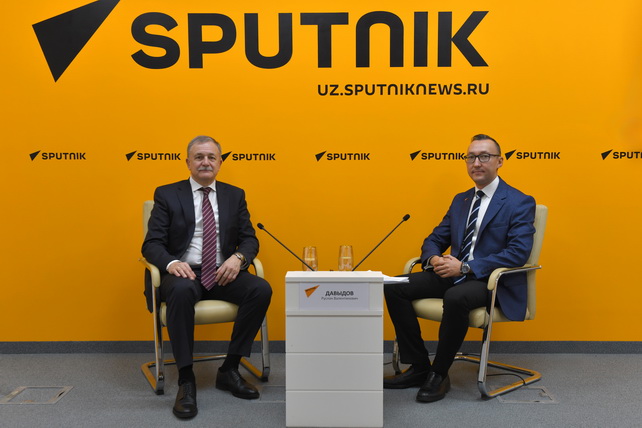
Uzbekistan and EAEU Strengthen Cooperation: Customs Cooperation Minister Holds Briefing in Tashkent
Uzbekistan and EAEU Strengthen Cooperation: Customs Cooperation Minister Holds Briefing in Tashkent
Tashkent, Uzbekistan (UzDaily.com) — A briefing by Ruslan Davydov, Minister for Customs Cooperation of the Eurasian Economic Commission (EEC), was held at the Sputnik Uzbekistan multimedia press center, focusing on current status and future directions of collaboration between the Eurasian Economic Union (EAEU) and Uzbekistan.
Uzbekistan continues to strengthen its position as one of the most active observer states within the EAEU. According to Davydov, the country participates in all key integration processes and contributes its own initiatives, creating opportunities to expand economic and customs cooperation.
A central topic of discussion was Uzbekistan’s potential accession to the EAEU’s unified customs transit system. Davydov noted that this step would simplify goods movement, increase procedural transparency, and harmonize customs administration approaches across the region.
Bilateral trade is also showing stable positive growth. Last year, trade between Uzbekistan and EAEU countries reached $15 billion, and in the first seven months of this year, it grew by an additional 10%, demonstrating Uzbekistan’s role as a reliable and strategic economic partner for the Union.
The briefing also touched on cultural and historical cooperation. Davydov thanked Uzbekistan for the restoration and relocation of the monument to Mikhail Pospelov—the real-life prototype of the legendary customs officer Vereshchagin from the film White Sun of the Desert. He described the monument as a symbolic site for customs services across the CIS, where officials can pay tribute and recall the motto: “I do not take bribes; I care for my country.”
Digitalization was another key focus. Davydov emphasized that artificial intelligence is becoming a crucial tool in modernizing customs administration. AI technologies are converting routine operations into digital formats and significantly improving risk management efficiency.
The main goal of customs authorities, he explained, remains the precise selection of control objects. AI allows inspections to focus on unscrupulous participants in foreign economic activity while eliminating redundant procedures for compliant businesses, making customs control faster, more targeted, and technologically advanced.
The briefing confirmed that Uzbekistan’s cooperation with the EAEU continues to develop dynamically, covering a growing range of areas—from trade and transit to digital technologies and humanitarian collaboration.